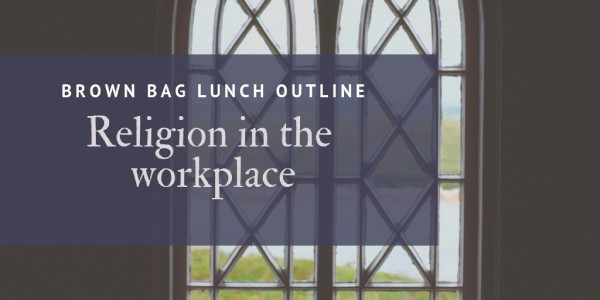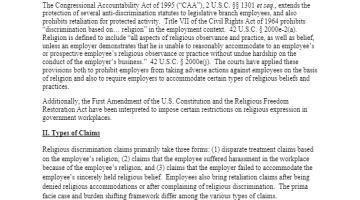I. Introduction
The Congressional Accountability Act of 1995 (“CAA”), 2 U.S.C. §§ 1301 et seq., extends the protection of several anti-discrimination statutes to legislative branch employees, and also prohibits retaliation for protected activity. Title VII of the Civil Rights Act of 1964 prohibits “discrimination based on… religion” in the employment context. 42 U.S.C. § 2000e-2(a). Religion is defined to include “all aspects of religious observance and practice, as well as belief, unless an employer demonstrates that he is unable to reasonably accommodate to an employee’s or prospective employee’s religious observance or practice without undue hardship on the conduct of the employer’s business.” 42 U.S.C. § 2000e(j). The courts have applied these provisions both to prohibit employers from taking adverse actions against employees on the basis of religion and also to require employers to accommodate certain types of religious beliefs and practices.
Additionally, the First Amendment of the U.S. Constitution and the Religious Freedom Restoration Act have been interpreted to impose certain restrictions on religious expression in government workplaces.
II. Types of Claims
Religious discrimination claims primarily take three forms: (1) disparate treatment claims based on the employee’s religion; (2) claims that the employee suffered harassment in the workplace because of the employee’s religion; and (3) claims that the employer failed to accommodate the employee’s sincerely held religious belief. Employees also bring retaliation claims after being denied religious accommodations or after complaining of religious discrimination. The prima facie case and burden shifting framework differ among the various types of claims.
1) Disparate treatment
a) Francis v. Perez, 970 F. Supp. 2d 48 (D.D.C. 2013) (Judge Ellen Segal Huvelle), aff’d, No. 13-5333, 2014 WL 3013727 (D.C. Cir. May 16, 2014) – The two “essential elements” of a religious discrimination claim are that (i) the plaintiff suffered an adverse employment action (ii) because of the plaintiff’s religion. Claims of disparate treatment based on religion follow the familiar McDonnell Douglas burden shifting framework.

